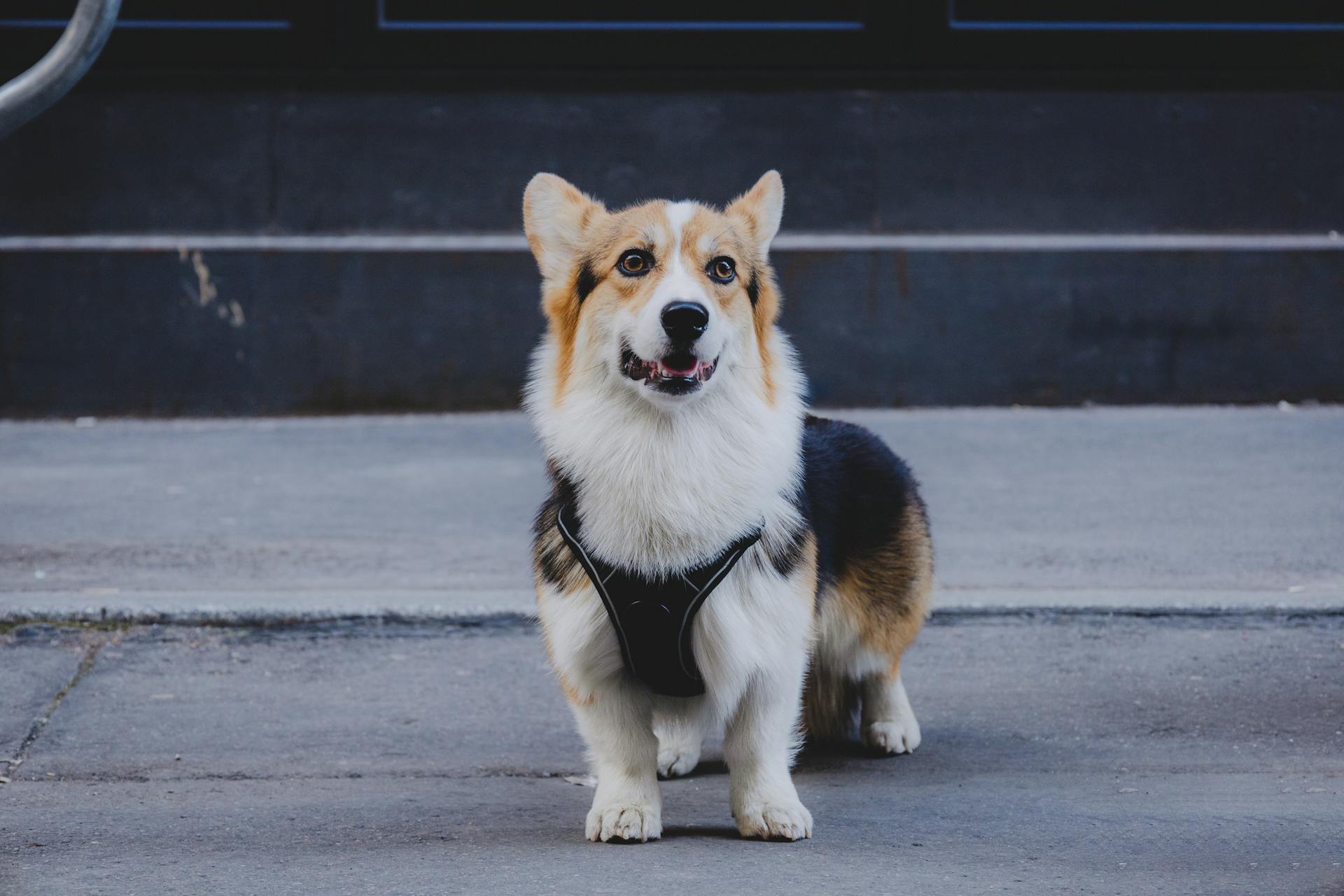
Welsh Corgis are known for their short stature, but don't let their size fool you - they're intelligent and energetic companions.
Their lifespan is relatively long, typically ranging from 12 to 14 years. This means you'll have plenty of time to form a strong bond with your black and white Welsh Corgi.
To keep your Corgi happy and healthy, regular exercise is essential. Aim for at least 30 minutes of physical activity per day, whether it's a walk, playtime, or training session.
As a relatively low-maintenance breed, Welsh Corgis require occasional grooming to keep their coats in top condition. Brush their fur at least once a week to prevent matting and tangling.
Discover more: Types of Welsh Corgi
How to Care
To keep your black and white Welsh Corgi's coat looking its best, brush them weekly with a rubber curry brush to remove dead hair. This should take about 10 minutes a session.
Their nails need regular trimming to prevent tears and overgrowth, which should be done every 2 to 3 weeks.
Daily brushing of their teeth is a must to maintain oral health and prevent gum disease. Brushing their teeth at least two or three times a week is a good starting point.
Their ears should be checked weekly for any signs of infection, such as redness or a bad odor. Wipe them out with a cotton ball and gentle ear cleaner to help prevent infections.
You should also keep an eye out for any sores, rashes, or signs of infection on their skin, in their nose, mouth, and eyes, and on their feet. Regular grooming will help you spot potential health problems early.
Daily exercise is a must to keep your black and white Welsh Corgi happy and healthy. They need to be able to run around and get plenty of physical activity to prevent obesity and boredom.
Health and Longevity
Black and white Welsh Corgis are generally healthy, but like all breeds, they're prone to certain health conditions. Not all black and white Welsh Corgis will get any or all of these diseases, but it's essential to be aware of them if you're considering this breed.
For your interest: Blue Merle Corgis
Intervertebral Disk Disease is a common issue in Welsh Corgis, especially due to their long backs. This can cause ruptures in the spinal disc, leading to unsteadiness, difficulty going up or down stairs, and even paralysis.
Hip dysplasia is another health concern in Welsh Corgis, which can cause hip pain, limping, and exercise intolerance. Responsible breeding to the AKC standards can help reduce the likelihood of this condition.
The average life span of a Welsh Corgi is 12 to 15 years, so it's crucial to take care of your furry friend's health to ensure they live a long and happy life.
Here are some common health issues to watch out for in Welsh Corgis:
- Intervertebral Disk Disease
- Progressive Retinal Atrophy (PRA)
- Hip dysplasia
- Eye issues (cataracts, glaucoma, retinal dysplasia)
Life Span
The average life span of the Pembroke Welsh Corgi is 12 to 15 years, which is relatively long for a breed of its size.
Living a long and healthy life as a Pembroke Welsh Corgi requires regular veterinary check-ups and a balanced diet.
Pembroke Welsh Corgis typically live between 12 to 15 years, which is a good amount of time to enjoy with your family.
Proper care and attention can help your Pembroke Welsh Corgi reach its full potential life span.
See what others are reading: Average Lifespan for a Boston Terrier
Common Health Problems

As you consider bringing a Welsh Corgi into your family, it's essential to be aware of the potential health issues that can affect this breed. Cardigan Welsh Corgis are generally healthy, but they can be prone to certain conditions.
Hip dysplasia is a common issue in many breeds, and Welsh Corgis are no exception. This orthopedic condition affects the development of the hip joint, leading to symptoms like hip pain, limping, and unusual gait.
Progressive retinal atrophy (PRA) is another eye disease that can affect Welsh Corgis. This family of eye diseases involves the gradual deterioration of the retina, causing dogs to lose their sight over time.
Intervertebral disk disease (IVDD) can also affect Welsh Corgis, particularly those with long backs. Signs of IVDD include unsteadiness, difficulty going up or down stairs, and knuckling over of limbs.
Here are some common health problems that can affect Welsh Corgis:
- Hip dysplasia: This orthopedic condition affects the development of the hip joint.
- Eye issues: Conditions like cataracts, glaucoma, retinal dysplasia, and progressive retinal atrophy (PRA) can impact vision.
- Intervertebral disk disease (IVDD): This condition affects the spine and its discs, leading to back strain or fractures.
- Patent ductus arteriosus: This heart defect causes the ductus arteriosus to not close when a puppy is born.
- Von Willebrand disease: This condition impacts the blood's clotting ability, causing excessive bleeding.
Training and Exercise
Training and exercise are crucial for your black and white Welsh corgi. They are easy and fun to train, learning quickly and retaining their lessons with enthusiasm.
Pembroke Welsh corgis are highly intelligent and hard-working, excelling at herding and most dog sports. They require at least one hour of exercise a day to stay happy and healthy.
Early socialization is key to helping your corgi feel comfortable around strangers, making them good watchdogs. However, they can be naturally reserved, so it's essential to avoid excessive fearfulness.
Temperament
Corgis are eager to please and very easy to train, making them a great breed for first-time dog owners.
Their intelligence and strong work ethic make them excel in organized sports like herding, agility, and obedience. They especially enjoy activities that involve running and following quick directions.
Corgis are wonderful watchdogs due to their amazing hearing ability and big-dog bark, making them a great addition to any family.
They are amiable and playful, making them excellent companions for people of all ages, including children and older adults. However, they can nip at the heels of children in an attempt to herd them, so proper training and socialization are a must.
Corgis require regular exercise to keep them happy and healthy, and they fare best when provided with long walks.
If this caught your attention, see: Welsh Corgi
Exercise Needs
Pembroke Welsh Corgis require regular exercise to stay happy and healthy.
They need at least one hour of exercise per day, which can be a combination of physical activity and mental stimulation.
This breed excels at herding and most dog sports, making them well-suited for active families.
Pembrokes can also be good apartment dogs as long as they get enough exercise and stimulation.
They shouldn't have to hop up and down from high furniture due to their short legs.
With proper exercise, Pembrokes can thrive in a variety of living situations.
Their love of activity and challenges means they need regular exercise to prevent boredom and destructive behavior.
A daily walk or playtime can help keep them happy and engaged.
On a similar theme: How Much Exercise Does a Bernese Mountain Dog Need
Cardigan Corgi
The Cardigan Welsh Corgi is a unique breed that's steeped in history and tradition. They're descended from the same family of dogs that produced the Dachshund and the Basset Hound.
Cardigans are generally smaller than their Pembroke cousins, with males weighing 30 to 38 pounds and females weighing 25 to 34 pounds. They're also known for their distinctive coat, which comes in a variety of colors including red, sable, and brindle.
Cardigans are double-coated, with a short undercoat and a longer, thicker topcoat that sheds continuously, especially during seasonal changes. To keep their coat under control, daily brushing and warm baths may be necessary during shedding season.
Cardigan Size
Cardigan Corgis are a beloved breed, and one of the first things you might notice about them is their size. Cardigans are 10.5 to 12.5 inches tall.
Their weight is also quite manageable, especially for a dog of their energy level. Males typically weigh between 30 to 38 pounds.
Females, on the other hand, are slightly smaller, weighing in at 25 to 34 pounds.
Cardigan Coat Color and Grooming
Cardigan Corgis have a double coat, with a short undercoat and a longer topcoat that sheds continuously, especially during spring and fall.
The coat comes in various colors, including red, sable, brindle, black, and blue merle, often with white markings on the legs, chest, neck, and tail.
They usually have a "fairy saddle" marking over their back, a trait that's been passed down through Welsh legend.
Daily brushing is a must to keep flying hair under control, especially during shedding season when you may need to brush your Cardigan frequently and give them warm baths to remove excess coat.
Cardigans have different coat lengths on their body, but soft, fluffy coats are not desirable as they don't protect the dog from the elements.
Brush your Cardigan's teeth at least two or three times a week to remove tartar buildup and bacteria, and daily brushing is even better to prevent gum disease and bad breath.
Trim your Cardigan's nails once or twice a month to prevent painful tears and other problems, and be careful not to cut too far and cause bleeding.
Check your Cardigan's ears weekly for signs of infection, such as redness or a bad odor, and wipe them out with a cotton ball and gentle ear cleaner to prevent infections.
As you groom your Cardigan, check for sores, rashes, or signs of infection on their skin, in their nose, mouth, and eyes, and on their feet, and look for clear eyes with no redness or discharge.
Cardigan Children
Cardigans love children, but their herding instincts can motivate them to nip at a youngster's feet or ankles.
Teach your child never to approach any dog while he's eating or sleeping or to try to take the dog's food away. No dog, no matter how friendly, should ever be left unsupervised with a child.
Cardigans are usually friendly toward other children in the household if they've been socialized with them.
Supervise any interactions between dogs and young children to prevent any biting or ear or tail pulling on the part of either party.
For another approach, see: Are Border Collies Friendly
General Information
The Black and White Welsh Corgi is a beloved breed known for its striking appearance and charming personality.
They typically weigh between 25-38 pounds and stand between 10-12 inches tall at the shoulder.
This breed is often referred to as a herder due to its original purpose of driving cattle and sheep on farms.
Personality Traits
Pembroke Welsh Corgis are an intelligent and devoted breed.
They are excellent watchdogs and take caring for their family seriously. This playful and lovable breed wants nothing more than to accompany its family wherever it goes and be included in the action.
Pembrokes are good with children, especially if raised with and socialized with them.
They like to bark and can be a bit more excitable than their Cardigan cousins.
They are initially wary of strangers and can be territorial.
Socialization from puppyhood helps them gain confidence in different situations.
Origin and History

The Pembroke Welsh Corgi has a rich and ancient heritage, dating back over 1,000 years to the time of the Celts. They were considered the same breed as the Cardigan Welsh Corgi until 1934.
The name "Corgi" may be attributed to the Celtic word for "dog" or "cor" and "gi" meaning "dwarf" and "dog". It's also said to mean "to watch over".
Their size made them ideal for working with cattle, allowing them to nip at the livestock's heels without being kicked. This trait became valuable to working Welsh crofters.
The Corgi's style of working actually drove the cattle farther afield rather than keeping them herded together. This allowed for a larger grazing area.
Competition among crofters for grazing land became fierce, and the Corgis helped define areas. Eventually, the Crown abolished this practice, and the crofters were able to own and farm their own land.
The Pembroke Welsh Corgi is the favored dog of Queen Elizabeth II.
Where to Adopt or Buy
Pembroke Welsh corgis can be pricey, with purebred pups from reputable breeders costing between $1,000 to $2,000 or more.
If you're set on bringing a Pembroke Welsh corgi into your home, it's essential to have experience handling strong-willed and independent pups.
You may find it challenging to adopt a Pembroke Welsh corgi from a shelter, but there are breeders located around the country.
To adopt a Pembroke Welsh corgi, look for a local breeder or contact a national organization that can help locate a rescue.
The Pembroke Welsh Corgi Club of America is a great resource, offering breeder contacts, regional club information, and rescue and adoption resources.
Rescue groups can be found in many states, and some regional organizations cover large areas, making it easier to locate a pet.
Explore further: American Kennel Club Lancashire Heeler
Frequently Asked Questions
What breed is a black and white corgi?
A black and white corgi is likely a Cardigan Welsh Corgi. This breed can come in a variety of colors, including black and white with tan or brindle markings.
Can Welsh Corgis be black?
Yes, Welsh Corgis can be black, and they can also have black with or without tan or brindle points. Black Welsh Corgis are a beautiful and distinctive color variation within the breed.
Featured Images: pexels.com


